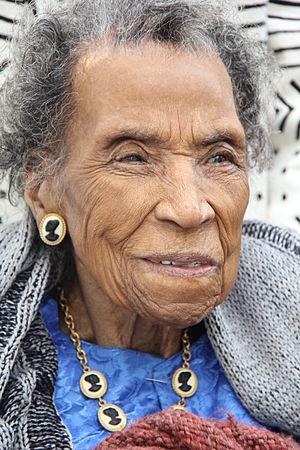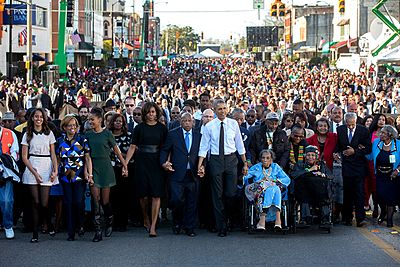Amelia Boynton Robinson facts for kids
Quick facts for kids
Amelia Boynton Robinson
|
|
|---|---|

Robinson in 2015
|
|
| Born |
Amelia Isadora Platts
August 18, 1911 Savannah, Georgia, U.S.
|
| Died | August 26, 2015 (aged 104) Montgomery, Alabama, U.S.
|
| Known for | Selma to Montgomery marches |
| Movement | Civil Rights Movement |
| Spouse(s) |
Samuel W. Boynton
(m. 1936; Bob Billups
(m. 1969; James Robinson
(m. 1976; |
| Children | Bill Boynton Jr. and Bruce Carver Boynton |
| Awards | Martin Luther King Jr. Freedom Medal (1990) |
Amelia Isadora Platts Boynton Robinson (born August 18, 1911 – died August 26, 2015) was an important American activist. She was a leader in the Civil Rights Movement in Selma, Alabama. Amelia played a key role in the famous 1965 Selma to Montgomery marches. She worked hard for equal rights for African Americans. In 1990, she received the Martin Luther King Jr. Freedom Medal. Amelia lived to be 104 years old.
Contents
Early Life and Education
Amelia Isadora Platts was born in Savannah, Georgia, on August 18, 1911. Her parents, George and Anna Eliza Platts, were African-American. Her family also had some Cherokee and German ancestors. Church was a very important part of Amelia's childhood.
When she was a young girl, Amelia started campaigning for women's right to vote. Her family always encouraged their children to read and learn. Amelia studied at Georgia State Industrial College for Colored Youth. She then went to Tuskegee Institute (now Tuskegee University), where she earned a degree in home economics in 1927.
Working for Change
Amelia first worked as a teacher in Georgia. Later, she joined the U.S. Department of Agriculture (USDA) in Selma, Alabama. She taught people in rural areas about growing food, healthy eating, and other important skills for their homes and farms.
In Selma, she met Samuel William Boynton, who also worked to help farmers. They got married in 1936. They had two sons, Bill Jr. and Bruce Carver Boynton. They also adopted Amelia's two nieces. Amelia and Samuel knew the famous scientist George Washington Carver from their time at the Tuskegee Institute.
Fighting for Voting Rights
In 1934, Amelia Boynton registered to vote. This was very hard for African Americans in Alabama. Laws at the time made it difficult for them to vote. These unfair practices kept most Black people from participating in politics for many decades.
Amelia wrote a play called Through the Years. It told the story of Spiritual music and a former slave who became a member of Congress. She used the money from the play to help fund a community center in Selma. In 1954, the Boyntons met Reverend Martin Luther King Jr. and his wife, Coretta Scott King. They met at the Dexter Avenue Baptist Church in Montgomery, Alabama, where King was a pastor.
In 1958, Amelia's son, Bruce Boynton, was arrested. He tried to buy food in a "whites-only" section of a bus station in Virginia. His case went all the way to the U.S. Supreme Court. Thurgood Marshall, a famous lawyer, argued his case. The Supreme Court ruled that segregation in bus terminals was illegal.
Leading the Civil Rights Movement
In 1963, Samuel Boynton passed away. This was a time when the Civil Rights Movement was growing stronger. Amelia made her home and office in Selma a meeting place for civil rights leaders. They planned strategies for battles over voting rights in Selma.
In 1964, Boynton ran for Congress in Alabama. She wanted to encourage more Black people to register and vote. She was the first African American woman to run for office in Alabama. She was also the first woman of any race to run for the Democratic Party in the state.
Amelia worked with leaders like Martin Luther King Jr. and James Bevel. They planned protests for civil and voting rights in late 1964 and early 1965. Selma had a population that was half Black. But only 300 African Americans were registered to vote in 1965. This was after thousands had been arrested in protests. By March 1966, after the Voting Rights Act of 1965 was passed, 11,000 people were registered to vote.
Bloody Sunday
To protest unfair segregation and the denial of voting rights, Amelia Boynton helped organize a march. This march to the state capital of Montgomery began on March 7, 1965. It was led by John Lewis and Hosea Williams. The event became known as Bloody Sunday.
Police stopped the marchers after they crossed the Edmund Pettus Bridge. They beat the peaceful demonstrators. Amelia Boynton was beaten until she was unconscious. A photograph of her lying on the bridge was seen by people all over the world.
Amelia also suffered throat burns from tear gas. She bravely took part in the next two marches. The events of Bloody Sunday helped change public opinion across the country. This led to the passage of the Voting Rights Act of 1965. Amelia Boynton was a special guest when President Lyndon Johnson signed the Voting Rights Act into law in August 1965.
Later Life
Amelia Boynton married again in 1969 to Bob W. Billups. He died in 1973. She married a third time in 1976 to James Robinson, a former classmate. James Robinson passed away in 1988.
Amelia Boynton Robinson continued to speak out about important issues. She traveled to different countries to talk about her experiences and the fight against racism in the United States. In February 2011, at 99 years old, she spoke to students at Savannah State University.
After several strokes, Amelia Boynton Robinson died on August 26, 2015. She was 104 years old.
Legacy and Awards
In 1990, Amelia Boynton Robinson received the Martin Luther King Jr. Freedom Medal. Her book, Bridge Across Jordan, shares stories and tributes from her friends and colleagues.

In 2014, the city of Selma renamed five blocks of Lapsley Street as Boyntons Street. This was to honor Amelia Boynton Robinson and Sam Boynton.
Amelia Boynton Robinson is played by Lorraine Toussaint in the 2014 film Selma. This movie is about the Selma Voting Rights Movement and the marches. In 2015, Robinson attended the State of the Union Address at the invitation of President Barack Obama. She was also with President Obama as he walked across the Edmund Pettus Bridge for the 50th Anniversary of the Selma Voting Rights Movement.
See also
 In Spanish: Amelia Boynton Robinson para niños
In Spanish: Amelia Boynton Robinson para niños
 | Charles R. Drew |
 | Benjamin Banneker |
 | Jane C. Wright |
 | Roger Arliner Young |

